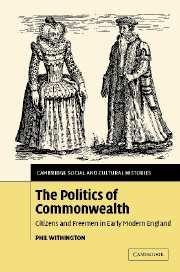Book contents
- Frontmatter
- Contents
- List of figures
- List of tables
- Acknowledgements
- Part I Introductions
- Part II Cultural resources: ideology, place, company
- Part III Honest distinctions: economy, patriarchy, religion
- 6 The economy of freedom
- 7 The patriarchal commonwealth
- 8 Calvinism, citizenship, and the English revolution
- Conclusion
- Bibliography
- Index
8 - Calvinism, citizenship, and the English revolution
Published online by Cambridge University Press: 23 December 2009
- Frontmatter
- Contents
- List of figures
- List of tables
- Acknowledgements
- Part I Introductions
- Part II Cultural resources: ideology, place, company
- Part III Honest distinctions: economy, patriarchy, religion
- 6 The economy of freedom
- 7 The patriarchal commonwealth
- 8 Calvinism, citizenship, and the English revolution
- Conclusion
- Bibliography
- Index
Summary
‘Seducers of divers sorts’
Thomas Hobbes' Behemoth, or the Long Parliament, provided one of the more controversial accounts of the ‘troubles’ of the mid-seventeenth century. In a series of dialogues between an eyewitness and his pupil, Hobbes exposed and explained for a Restoration ‘Public’ ‘the wickedness of that time’. That Charles II refused to license it did not prevent the text circulating at court before its unauthorised publication during the renewed parliamentary crisis of the later 1670s. Written to justify Hobbes' theory of political obligation and used, like Filmer's Patriarcha, to bolster the ‘Tory’ defence of church, state, and the Stuart succession, Behemoth diagnosed the ideological causes of the civil war. Moreover, unlike much subsequent historiography, Hobbes had no qualms in linking those ideas to agency and political practice, providing a holistic interpretation of the ‘causes, pretensions, justice, order, artifice, and event’ of his ‘iniquitous’ and ‘foolish’ countrymen's ‘actions’. To this end, he described a range of ‘seducers’ who had propagated ‘certain opinions in divinity and politics’ in order to ‘corrupt’ the ‘people in general’ into war against their monarch. The lesson in 1680 was that, just as they had succeeded in destroying the monarch once before, so the same ‘seducers’ were on the verge of doing so again: England's troubles had not gone away.
- Type
- Chapter
- Information
- The Politics of CommonwealthCitizens and Freemen in Early Modern England, pp. 230 - 264Publisher: Cambridge University PressPrint publication year: 2005



